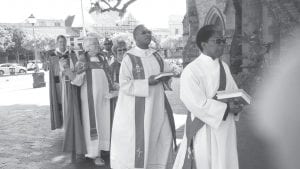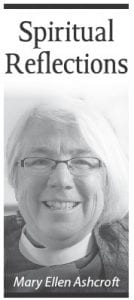Since my last columns I have traveled a lot. Some journeys I would give anything to avoid—such as walking with my 37-year-old son and his family since his terrible cancer diagnosis.
Other journeys were planned (and funded by a Lilly Foundation Clergy Renewal grant). I visited the Iona community in Scotland, hiked in the Scottish Highlands and the French Alps, and canoed in the Lake District—all with dear friends. I visited my old stomping grounds in the Pacific Northwest and Santa Fe.
But the really big trip was two months in South Africa, where I had lived from 1974-1982. South Africa is a beautiful country, with amazing people, extraordinary wild places, fantastic flora and fauna. I hiked, paddled, visited many old friends, and talked to hundreds of people. I worshipped in some Anglican churches (part of the same worldwide denomination as the Episcopal Church).
For my sabbatical grant, I focused on three issues relevant to the church here and there: 1) church and context. 2) wilderness/place in spiritual understanding. 3) arts and social change. I’d like to share some of what I’ve discovered in these columns.
First, context. What does it mean to be deeply contextual as a church, responding to the particular situation/ time/place in which we find ourselves—and at the same time true to the message of Christ?
Christians have struggled with this question since earliest days. How do we “hold out the word of life,” “become all things to all people” (as Paul writes), but in this particular time and place? As people of faith, we cannot simply cozy in the old ways, like those early Jerusalem Christ-followers who wanted the law and circumcision imposed on new gentile believers. These rules were clearly God’s will, they said, look at Exodus, Leviticus, Deuteronomy!
So simple conservatism is not the answer, but neither can we just “go with the flow.” Paul made this clear to new Christ followers in Corinth and other places. Christ disciples must follow Jesus within their context.
This is complex, because we are so fully immersed in our own cultural biases that we are often blind to them. For example, as Americans we tend to be highly individualistic, consumerist and focused on sex, all of which will inevitably alter our take on the message of Jesus. We may find ourselves unable to even see the teachings in scripture about community or the stringent calls of caring for neighbor.
How does this balancing act play out? We walk, not tipping into conservatism that says, “This is our understanding from time immemorial!” while also not following our society down a path that says, “Hey whatever feels good!”
So the question: What does it mean to be deeply contextual as a church, responding to the particular situation/time/place in which we find ourselves— and at the same time true to the message of Jesus?
The South Africa I lived in from 1974-1982 could not escape its context—apartheid was the terrible soup in which everyone swam. A dire situation, yet tremendously clarifying for the church, few of which were able to live with a simple “me and Jesus” message or one that preached God’s blessing on the righteous. Most, like the Anglican Church I worked in, were deeply engaged in the struggle against apartheid.
Impending revolution tends to clarify the mind. Twenty-two years after that first democratic election, and the presidency of Nelson Mandela, many Anglican Churches I visited in March/April had lost their focus. Instead of being rooted in 2016 and ongoing challenges of inequality and violence, they seemed to be dishing out what people wanted to hear. Despite poverty all around, services were like certain mega church services dropped into South Africa—with sentimental, individualistic, “Jesus is my boyfriend” choruses and pride in not using liturgy but an overhead screen, not preaching from a lectionary, but whatever the preacher wanted to say, (which strangely enough had little to do with God’s call to care for the poor). And of course this kind of worship attracts a certain kind of person: the faces around me were mainly white.
As I looked around, I wondered: how could a different, prophetic voice speak here? Wonderful, faithful people, but it felt as if the church had slipped into simply comforting the comfortable.
It made me realize how important the challenging voice is—whether heard in the pain of the society around us, the prophetic stranger or in scripture. I think of great theologian Stanley Hauerwas, who in the days after 9/11, kept saying, “Christians cannot simply go along with the knee jerk ‘bomb them’ mentality. They need to grapple with scripture.”
I visited a couple of wonderful churches who were struggling to be contextual, one the Anglican Cathedral in Grahamstown, whose worship included a range of races, music, liturgy and voices. But as I talked to the pastor he said diversity was both a gift and a challenge— it’s much harder to build community when you have kids from a private Anglican school along with street kids, all races, people who are doing doctoral studies at the local university and workers with no education at all. No wonder they say that in the USA, the most segregated hour of any week is on a Sunday morning.
What does it mean to be deeply contextual, responding to the particular situation/ time/place in which we find ourselves—and at the same time true to the message of Jesus? It’s much easier to tip into comforting conservativism or relativist apathy. How do we, in our churches and communities, make space to hear the “other”—challenging our comfortable, simple stances with uncomfortable truths?
Each month a member of the Cook County Ministerium will offer Spiritual Reflections. This month’s contributor is Mary Ellen Ashcroft, Vicar of Spirit of the Wilderness Episcopal Church.




Loading Comments